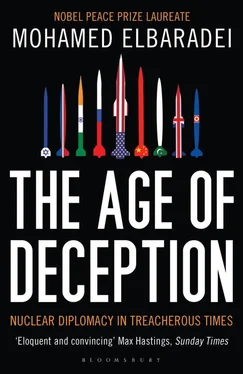Mubarak and I spoke again about Iraq when I asked him to intervene with Saddam Hussein to improve his cooperation with the United Nations. Mubarak mentioned that he had received a letter from Saddam saying, “Do not worry; everything is okay.” He also passed on a bit of information. “I know that Saddam has biological weapons,” Mubarak told me, “and he is hiding them in the cemeteries.” It was the first and last time I heard that rumor. [10] In President Bush’s memoir, Decision Points, he writes that Mubarak had told U.S. general Tommy Franks that “Iraq had biological weapons and was certain to use them on our troops.” This information, Bush writes, influenced his thinking on Iraq’s WMD status and the need for military action. Quoted in Diaa Bekheet, “Bush: Mubarak Informed U.S. that Iraq Had Biological Weapons,” Voice of America, November 11, 2010. Retrieved from VoANews.com , at www.voanews.com/english/news/Bush-Says-Egypts-Mubarak-Informed-US-that-Iraq-Had-Biological-Weapons-107247693.html .
With such sentiments at work, inevitably the Arab Summit devolved into a series of virulent arguments. Sheikh Zayed’s asylum proposal somehow did not get put on the agenda. For this reason the sheikh and his delegation were furious with the secretary-general of the Arab League, Amr Moussa. The idea of sending a delegation to Iraq was aborted altogether. Without a united position, the leaders of the Arab world in the end had almost no say or influence in a war launched at the heart of their region—other than, in some cases, to provide bases and facilities for U.S. troops.
Even the most experienced and pragmatic politicians seemed unable to leverage diplomatic influence. French president Jacques Chirac had voiced strong disagreement with the Bush doctrine of “you’re either with us or against us.” His candor was in evidence when Blix and I met with him in mid-January at the Elysée Palace and complained that we were not getting much information from Western intelligence agencies regarding Iraq’s alleged WMD programs. Chirac was astonishingly candid. “You know why you don’t get the information,” he declared. “It is because they don’t have any.”
In fact, French intelligence experts had been telling Blix and me they were sure that Iraq was continuing to keep “small quantities” of chemical and biological weapons. The head of the French intelligence agency happened to be present at our meeting, and his face dropped at Chirac’s casual remark. Chirac paid no attention, taking his bluntness one step further: intelligence agencies, he said, were in the habit of first reaching their conclusions and then building the supporting arguments. By this time, his intelligence chief was studying the carpet intently, avoiding eye contact.
To my ears, it was refreshing to hear a leader of Chirac’s stature speak so openly what we at the Agency were thinking. He said the threat Bush had made to the Security Council—that the United Nations would become irrelevant if they did not adopt a resolution to use force—was complete nonsense. If the United States decided to move on its own, Chirac said, “It will be the U.S. that will be regarded as an outlaw, and not the UN.” Unfortunately, in the United States at the time, Chirac’s stance on Iraq was marginalized, even derided. [11] Many U.S. leaders characterized the French position on the Iraq war as disloyalty; members of Congress went so far as to demand that French fries and French toast on the House cafeteria menu be renamed “freedom fries” and “freedom toast.”
Soon after that encounter, in early February Blix and I met with British prime minister Tony Blair at his modest office at Downing Street. He saw each of us separately: Blix first, then me. This was unusual; most of our interactions at that level were conducted jointly. Blair was relaxed and informal, with his jacket off. When he came out after seeing Blix, he jokingly called out, “Next!” as if I were at the dentist.
The tone of the meeting was positive. I voiced to Blair my concern that going to war with Iraq over WMD would ignite regional tensions. “The perception in the Middle East,” I explained, “is that the focus on Iraq is not because of weapons of mass destruction per se, but because Iraq is a Muslim and Arab country, and therefore is not allowed, like Israel, to have such weapons.” I echoed something Chirac had said: that the eagerness to take action on Iraq would not sell well in the face of doing nothing about the Israeli-Palestinian conflict. I also mentioned the criticisms I had been hearing about the disparity in treatment between Iraq and North Korea.
Blair expressed understanding of my points and shared my concerns about inaction on the Palestinian issue. He recounted that Bush had promised he would address the Palestinian situation once the “matter of Iraq” was settled.
It was Jack Straw, the British foreign minister, who explained the British rationale: they were trying to give full support to the Americans in public, he said, in order to be able to influence U.S. decisions privately. This view remained consistent: it would be much more dangerous to have the United States act on its own, and by “hugging” the Americans, Britain had a better shot at controlling their actions. Frankly, I did not notice a whiff of British influence over U.S. policy during the Blair administration. It always seemed to be a one-way street, with the British acting as spokespersons or apologists for U.S. behavior.
With so little to make their case on the nuclear front—other than the aluminum tubes allegations and the Niger yellowcake fiasco—many U.S. officials nonetheless remained certain that Iraq had at least some chemical and biological weapons squirreled away. Regarding nuclear weapons, the suggestions became, on occasion, outlandish: I recall a meeting at the U.S. State Department with Assistant Secretary John Wolf in which he kept repeating that our inspectors needed to seize all the hard drives of the Iraqi scientists’ computers, to get access to what was going on. At another point I met with the House Foreign Relations Committee, chaired by Henry Hyde. We were explaining the progress of our inspections when Congressman Tom Lantos, the ranking Democrat, broke in: “I have a solution for you,” he said. “Take all the Iraqi scientists on a two-week cruise, and that will give you all the information you need about the Iraq program.” I hoped he was joking. I did not reply.
Clearly, what Chirac had said was true: neither the United States nor other countries had much in the way of intelligence information to back their convictions about Iraq’s development of WMD. At the IAEA, during this period, we received very few leads from the Americans or other intelligence agencies, in sharp contrast to the extensive information received by the IAEA and UNSCOM in the early 1990s.
In the absence of such intelligence, the Americans pinned their best hopes on the defection of Iraqi scientists, who, they were sure, would reveal insider information about the weapons locations and programs the United States was so sure existed. This was the motivation behind the strategy of taking scientists and their families abroad for interviews. However, most of Iraq’s nuclear experts did not even want to be interviewed in the absence of a representative of the Iraqi authorities or without a tape recorder. They were intent on avoiding misunderstandings—with the Iraqi authorities or with the inspectors. We could not force them to leave the country, nor were we keen to do so, given the potential repercussions for their extended families and friends.
Moreover, we felt we had sufficient means to facilitate our inspections without this additional measure; we had confidence that, given a reasonable timeline, we would uncover whatever illicit WMD activities existed. IAEA inspectors were well acquainted with the scientific and technological capacities of Iraq, and with the physical lay of the land. Even after a four-year hiatus, it had not taken long for the returning IAEA inspectors to recover a basic sense of Iraq’s nuclear capacity.
Читать дальше












